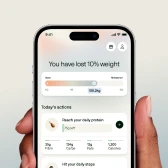“Eating a Balanced Diet.” NHS. www.nhs.uk/live-well/eat-well/how-to-eat-a-balanced-diet/eating-a-balanced-diet. Accessed 15 Oct. 2025.
Many people start their Mounjaro journey with high expectations after hearing about how weight loss medications can quieten ‘food noise’.
So, it’s understandable that you’ll have questions if you’re weeks into your treatment and still feeling as hungry as you were before. Here are some of the factors that could be at play.
Key Takeaways
- Mounjaro mimics natural hormones that make you feel full
- Some people need a higher dose before they stop feeling hungry
- It’s normal not to feel the effects straight away
- If you’re still hungry after 2-3 months on Mounjaro, seek medical advice

How Mounjaro curbs appetite
Tirzepatide, the active ingredient in Mounjaro, works by mimicking the hormones GLP-1 and GIP, which your body naturally produces. Boosting GLP-1 and GIP with Mounjaro means that you feel full after smaller portions and your overall hunger levels should drop.
Well, that’s the theory—but some people find they’re still hungry on Mounjaro. If this is you, you’ll want to know why.
8 reasons why you may still be hungry on Mounjaro
Let’s take a look in more detail at the reasons your hunger levels haven’t decreased on Mounjaro.
1. It’s early days
If you’ve only just started Mounjaro, it might simply be a case of waiting a bit longer. Some trials have shown that most people don’t notice appetite suppression until at least a few weeks into treatment.
2. You’re on a low dose
There are six Mounjaro dosages available, from 2.5mg to 15mg. You’ll start off on the lowest dose (2.5mg). Then after four weeks, if you’re tolerating the medicine well, your prescriber might increase your dose.
The four-week waiting time before dose increases is there for a reason: clinical trials show this is an effective way to build tolerance to side effects. Talk to your prescriber if you don’t feel your current dose is doing anything for you.
3. You’re stressed
Emotional eating is a real thing. Research has established a link between stress and obesity, with many complex factors involved, including poor mental health and stress leading to increased convenience food consumption.
As much as we wish Mounjaro could take away your stress, it’s not a magic bullet. If you’re feeling unhappy or stressed out, especially over a prolonged period, this can affect your food choices and physiological processes.
4. You’re eating the wrong foods
Yes, Mounjaro decreases appetite in most cases, but you still need to make healthy food choices (including high-protein and fibre foods) to see the full benefits.
Foods high in sugar, refined carbs and saturated fats (like crisps, cake, soft drinks and white bread) can interfere with the effects of Mounjaro by causing blood sugar spikes or crashes. They won’t fill you up, so you could find yourself feeling hungry despite taking Mounjaro because you’re consuming calories with little to no nutritional value.
5. You’re not eating enough
It might sound counterintuitive, but eating too little can actually make you feel hungrier in the long run. If you’re skipping meals or drastically cutting calories because Mounjaro has reduced your appetite, your body may respond by increasing hunger hormones.
Make sure you’re still getting enough calories to support your body’s needs—especially if you’re active. If you’re unsure how much you should be eating, a healthcare provider can help.
If you’re a Voy user, your treatment specialist will be able to recommend a tailored plan. You could also try an online TDEE calculator to learn your total daily energy expenditure, a measure of how many calories you burn per day.
6. You’re exercising more
Starting Mounjaro often motivates people to adopt healthier habits, including more frequent workouts. But if you’ve recently ramped up your physical activity, your body will naturally need more energy—and that can mean feeling hungrier.
The key is to fuel your activity properly with balanced meals that include carbohydrates, protein, and healthy fats.
7. You’re actually thirsty
It’s worth keeping an eye on your hydration levels. Thirst is often mistaken for hunger, and dehydration can make you feel hungrier or more fatigued than you actually are. Aim to drink water regularly throughout the day, especially if you’re exercising more or adjusting to Mounjaro’s effects on digestion.
8. You’re hormones are nudging your appetite up
For people who have periods, cyclical hormone changes can also influence appetite, whether you’re taking Mounjaro or not. It’s normal to notice increased hunger in the luteal phase (the two weeks before your period), when progesterone levels rise and your body naturally burns more energy.
Tips to avoid overeating on Mounjaro
If you’re still feeling hungry on Mounjaro, you might be worried you’ll end up overeating. This is why it’s important to eat foods containing key nutrients that make you feel full.
Eat a balanced diet
Complex carbohydrates like brown bread, pasta and quinoa take longer for your body to digest, leaving you feeling full for longer. Each meal should ideally contain some complex carbs, some protein, a little healthy fat—like olive oil—and some fruit or veg. Balanced meals like this help regulate digestion.
Stick to regular meal times
Some research suggests that eating meals at the same time every day, with roughly the same amount of calories, is an effective strategy for sustainable weight loss. Blood sugar levels are more stable when you eat on a predictable schedule.
Stay hydrated
Water is crucial for digestion, and it’s recommended to drink 6-8 glasses per day.
Eat mindfully
Meet emotional eating’s nemesis: mindful eating. That means tuning in to your body’s cues like hunger and fullness, appreciating the way food energises you, and reframing your attitude to food. You may have negative feelings around food, and we know that’s difficult to shake off, but trying to cultivate a neutral attitude to it can help combat emotion-driven urges.
Talk to a healthcare professional
If you’re struggling with what to eat or finding the right foods to keep you full and energised, a healthcare professional can help you draw up a diet plan and support you in finding a routine that works for you.
On Voy’s science-backed weight loss treatment, you’ll be matched with a certified Voy treatment specialist to build a plan that fits your lifestyle. You’ll learn how to manage your portion sizes and navigate challenges like stress eating.
Foods that keep you full for longer on Mounjaro
Some foods are better than others at filling you up. Foods to choose on Mounjaro include:
- Starchy vegetables: such as potatoes and sweet potatoes
- Complex carbohydrates: such as brown rice, wholewheat pasta, wholemeal bread, quinoa
- Fibrous foods: such as beans, lentils, oats, peas, chickpeas
- Protein: such as cottage cheese, Green yoghurt, eggs, chicken, fish
On Mounjaro, different foods can cause side effects for different people. So keep a food diary to identify any possible triggers.
Your Mounjaro journey
Everyone has their own experience on Mounjaro, and no two bodies react to it in the exact same way. That’s why patience is important in the initial weeks, to give yourself time to respond to it before increasing your dose.
If you’re already on a weight loss journey with Voy, don’t forget that if you need nutrition advice, your treatment specialist is just a call away. And if you’re curious about how to lose weight and keep it off, take our quiz to see if our science-backed plans could help you.





















